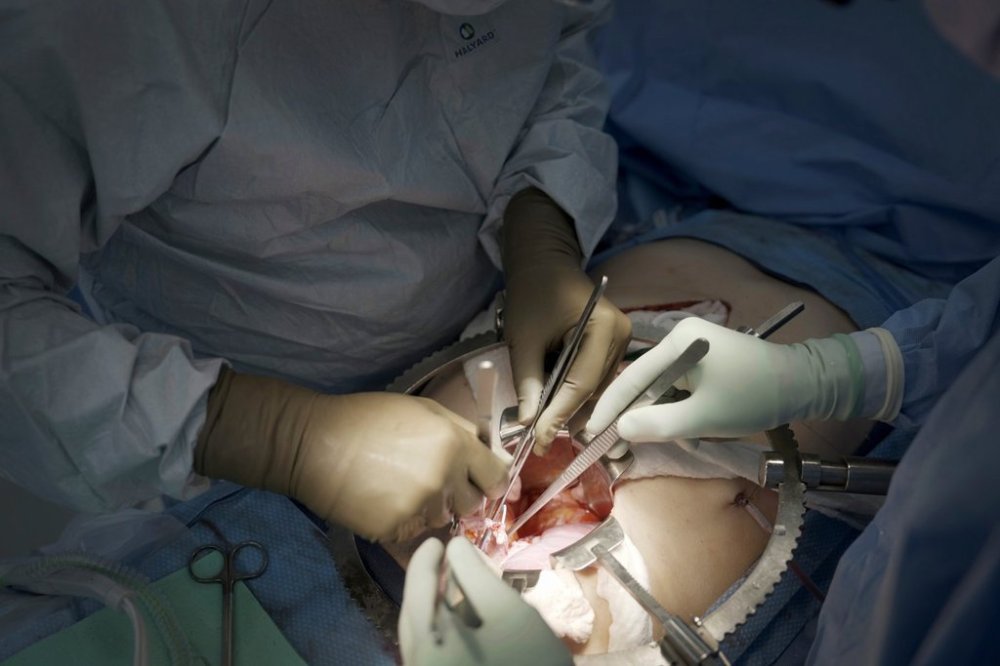First clinical trial of pig kidney transplants gets underway
Advertisement
Read this article for free:
or
Already have an account? Log in here »
To continue reading, please subscribe:
Monthly Digital Subscription
$0 for the first 4 weeks*
- Enjoy unlimited reading on winnipegfreepress.com
- Read the E-Edition, our digital replica newspaper
- Access News Break, our award-winning app
- Play interactive puzzles
*No charge for 4 weeks then price increases to the regular rate of $19.00 plus GST every four weeks. Offer available to new and qualified returning subscribers only. Cancel any time.
Monthly Digital Subscription
$4.75/week*
- Enjoy unlimited reading on winnipegfreepress.com
- Read the E-Edition, our digital replica newspaper
- Access News Break, our award-winning app
- Play interactive puzzles
*Billed as $19 plus GST every four weeks. Cancel any time.
To continue reading, please subscribe:
Add Free Press access to your Brandon Sun subscription for only an additional
$1 for the first 4 weeks*
*Your next subscription payment will increase by $1.00 and you will be charged $16.99 plus GST for four weeks. After four weeks, your payment will increase to $23.99 plus GST every four weeks.
Read unlimited articles for free today:
or
Already have an account? Log in here »
WASHINGTON (AP) — The first clinical trial is getting underway to see if transplanting pig kidneys into people might really save lives.
United Therapeutics, a producer of gene-edited pig kidneys, announced Monday that the study’s initial transplant was performed successfully at NYU Langone Health.
It’s the latest step in the quest for animal-to-human transplants. A second U.S. company, eGenesis, is preparing to begin its own pig kidney clinical trial in the coming months. These are the first known clinical trials of what is called xenotransplantation in the world.

To protect the study participant’s identity, researchers aren’t releasing information about when the NYU surgery was performed or further patient information.
NYU’s Dr. Robert Montgomery, who led the transplant team, told The Associated Press his hospital has a list of other patients interested in joining the small trial, which will initially include six people. If all goes well, it could be expanded to up to 50 as additional transplant centers join.
The Food and Drug Administration is allowing the rigorous studies after a series of so-called “compassionate use” experiments, with mixed results. The first two gene-edited pig kidney transplants were short-lived.
Then doctors began working with patients who badly needed a kidney but weren’t as sick as prior recipients. At NYU, an Alabama woman’s pig kidney lasted 130 days before she had to return to dialysis. The latest record, 271 days, was set by a New Hampshire man transplanted at Massachusetts General Hospital; he also is back on dialysis after the pig organ began declining and was removed last month. Others known to be living with a pig kidney are another Mass General patient and a woman in China.
“This thing is moving in the right direction” as doctors learn from each patient’s experience, NYU’s Montgomery said. He noted the ability to resume dialysis also gives a safety net.
More than 100,000 people, most needing kidneys, are on the U.S. transplant list, and thousands die waiting. As a potential alternative, scientists are genetically altering pigs so their organs are more humanlike, less likely to be immediately attacked and destroyed by people’s immune system.
United Therapeutics’ trial is testing pig kidneys with 10 gene edits, “knocking out” pig genes that trigger early rejection and excessive organ grown and adding some human genes to improve compatibility.
—-
The Associated Press Health and Science Department receives support from the Howard Hughes Medical Institute’s Department of Science Education and the Robert Wood Johnson Foundation. The AP is solely responsible for all content.

